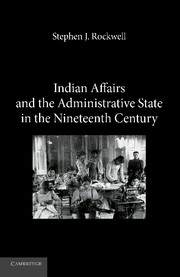Book contents
- Frontmatter
- Contents
- Acknowledgments
- Introduction
- 1 The Myth of Open Wilderness and the Outlines of Big Government
- 2 Managed Expansion in the Early Republic
- 3 Tippecanoe and Treaties, Too: Executive Leadership, Organization, and Effectiveness in the Years of the Factory System
- 4 The Key to Success and the Illusion of Failure
- 5 Big Government Jacksonians
- 6 Tragically Effective: The Administration of Indian Removal
- 7 Public Administration, Politics, and Indian Removal: Perpetuating the Illusion of Failure
- 8 Clearing the Indian Barrier: Indian Affairs at the Center of National Expansion
- 9 Containment and the Weakening of Indian Resistance: The Effectiveness of Reservation Administration
- 10 What's an Administrator To Do? Reservations and Politics
- Conclusion: The Myth of Limited Government
- References
- Index
Introduction
Published online by Cambridge University Press: 06 July 2010
- Frontmatter
- Contents
- Acknowledgments
- Introduction
- 1 The Myth of Open Wilderness and the Outlines of Big Government
- 2 Managed Expansion in the Early Republic
- 3 Tippecanoe and Treaties, Too: Executive Leadership, Organization, and Effectiveness in the Years of the Factory System
- 4 The Key to Success and the Illusion of Failure
- 5 Big Government Jacksonians
- 6 Tragically Effective: The Administration of Indian Removal
- 7 Public Administration, Politics, and Indian Removal: Perpetuating the Illusion of Failure
- 8 Clearing the Indian Barrier: Indian Affairs at the Center of National Expansion
- 9 Containment and the Weakening of Indian Resistance: The Effectiveness of Reservation Administration
- 10 What's an Administrator To Do? Reservations and Politics
- Conclusion: The Myth of Limited Government
- References
- Index
Summary
Big government won the West.
In the early republic, policymakers and administrators at the national level utilized the treaty system to order and control relations with Indian nations, and they used a string of government trading houses known as the factory system to pacify affairs on the U.S. frontiers. Together with trade regulation and licensing systems, government policy and public officials drove the lucrative fur trade into the control of large and accountable major firms, while limiting the potential for costly conflicts that would threaten the new nation's survival. In the 1830s, the federal government oversaw the forced removal of a hundred thousand Indians from their homes in the Southeast, relocating them on administratively manageable reservations west of the Mississippi River. Other removals in other parts of the continent fill the nineteenth century. Throughout the heart of the nineteenth century, political leaders and public administrators isolated and contained Indians on reservations and in areas in the recently acquired West, extending federal jurisdiction and administrative structures into new areas and finally across the continent. Throughout these years, policymakers and administrators designed and effected a massive land transfer program that allotted millions of acres of tribal lands to individual Indian and non-Indian landowners, an effort which reached its peak after passage of the General Allotment Act, or Dawes Act, in 1887.
These efforts were difficult and complicated, yet the Indian Office in the nineteenth century effectively administered national policy related to westward expansion and achieved its primary mission in each major era of Indian policy.
- Type
- Chapter
- Information
- Publisher: Cambridge University PressPrint publication year: 2010



